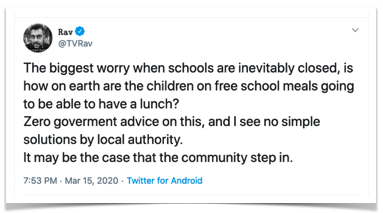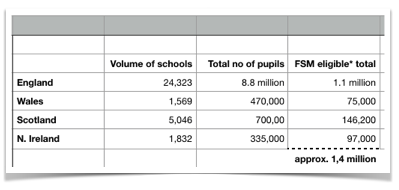
Here’s some collated questions, views and ideas from teachers, and eduTwitter and my thoughts on what could be done by government and schools. What is missing? What else is possible?
[Last edit: March 31, 11am, working document*, input welcome].
*Today’s guidance states a new policy position
Our school is open over the Easter holidays and our food supplier is able to continue to provide meals for children eligible for free school meals who are not in school. Is that allowed?
“Whilst the vouchers are for term time only, if there is a local arrangement to supply food that the school and the supplier intend to continue over this period then that can be agreed and managed locally. This would need to be manageable within schools’ existing resources, as there will not be additional funding available for this purpose.”
This is unacceptable. At our tiny rural primary school parents have donated hundreds of pounds of personal money in the last month to feed local families’ children alone and support school with its extra costs, this is unsustainable as many themselves are now out of work or at reduced pay. — Ministers do not appear to understand the gravity of the situation.
Not scrapping FSM eligibility criteria (as set out in 10 Actions for Government to take now, below) and allowing schools to order the vouchers they need for families, rather than only allowing schools to get vouchers to those children that meet eligibility test criteria, will mean children are starving and schools already starved of funds, will feed them because they must through volunteer support where they can, but have to do so at their own expense.
This is wrong and must be fixed. The virus and its economic effects on millions of families, do not respect a two- week school holiday. Children in families with no recourse to public funds have nothing, and now have no work — or will have to go out to work to feed their children but jeopardise their own, their families, and our community public health because the system puts them in an impossible position.
The well documented 5-week delays in Universal Credit applications, which are on a steep incline, will mean children have nothing for 5 weeks although their poverty is clear, while the eligibility ’criteria’ is met in the system.
Government must scrap eligibility tests and criteria and fund schools for every FSM they provide to any child in need, at any time.
Previous question asked:
How will the DfE know how much money a school needs in order to meet growing demand for FSM without knowing how many children at each school need FSM?
Suggested answer:
They won’t. There will be an inevitable lag. The DfE must offer schools funding as demand grows, and allow them to plan securely. Schools must be able to offer families a way to indicate need, and be able to meet it, even if not ‘eligible’ for for FSM.
Assumptions:
(1) The number of children in need of an FSM will grow over the next few weeks and months.
(2) The school census is the mechanism for telling the DfE a count of how many children are FSM eligible, and it does not get taken next until May 21st.
(3) The January 2021 school census is the next mechanism for telling the DfE a count of how many children are FSM eligible, and taken as the basis for the count of pupil premium school funding.
Public Health England has updated its guidance for schools today. As school closures at scale may look increasingly more likely, many in civil society have called on the Government to offer cash measures to ensure that children do not go hungry.
Health and education are both devolved issues. Who takes leadership here? It is also a question of interaction with DWP.
About 1.5 million children across the UK are currently eligible for free school meals in families living on a very low income. The precarious nature of many parents’ employment in the gig economy and service industry, will push that number higher due to the economic and health effects of the virus. Children must not experience barriers to access food and support.
Child Poverty Action Group is calling on the government to match the support it is providing to small business and boost the income of struggling families with children by increasing child benefit by £10 per week for the duration of the pandemic response, for example. This is in addition to and not instead of the actions needed on FSM. This should be step zero for the government to action.
Now is not a time for eligibility tests, conditionality or exclusion about feeding children.
-
- What are the implications for eligibility, of the Budget 2020 changes in welfare criteria and coronavirus support measures?
- How can children who become newly eligible, find out that they are and access needed support available to them if out of school> who is responsible for approvals, and communications between families and schools if closed?
- Many families will now be staying at home for all meals, without access to meals at work, in canteens, or staff discounts. Where supermarket shelves are empty, an increase in the number of people needing fed at home may put an additional strain on families’ supplies and budgets.
We already know, that while 1.1 million children in English primary and secondary schools were eligible for and claiming free school meals, there were also between 2.2 million and 4.1 million children living in poverty in 2016/17, depending on the measure used. [Source: The Children’s Society.]

The Government needs to do everything within its power to mitigate the effects of Coronavirus on children’s nutrition and in a sustainable solution beyond the short term. School staff across Twitter at least, seem to have plenty of ad hoc ideas going on, but there is no public guidance from the Department, at the time of writing. Local areas need empowered to support their own families based on local needs and knowledge.
Some schools are already closing. Some parents are withdrawing children as a precautionary measure. All may need support.
![]()
A. Ten things government could do quickly
1. Appoint a dedicated Local Authority central contact for
(a) families and (b) separate for school (telephone and email) — local knowledge needed to answer questions and offer support. (Note challenge D2)
2. Remove eligibility and conditionality requirements to allow all children to access FSM based on need, not current criteria. This change would remove any questions or confusion over ‘do I qualify?’ especially for families newly claiming welfare payments as part of coronavirus support measures. This may see government simply need to treble FSM allocation, so schools can help their wider community including children not classed as eligible, but in need.
3. Make funding available now and quick to access for:
- Breakfast club bags
- All FSM eligible children (2-18), including infants
- meeting need at aggregated, not individual level.
4. Emergency funding must be made accessible and quick to claim for those families who are going to slide into poverty and become FSM eligible but may not be able to demonstrate Universal Credit eligibility for example. (Delays in UC must not delay getting FSM to a child). Schools must have discretion based on need.
5. Empower local schools to decide how to distribute this best –– as cash transfers, emergency feeding programmes, vouchers, or otherwise.
6. *Unlink FSM funding, eligibility, and individual level pupil premium (PP) registration. [This may be a longer term issue that can be ignored for now, if not counted till the January 2021 census.] Clarify any short term, and further implications. There may be interconnected systems and implications for algorithms (at LA level) of PP system registration. Schools will need to know whether they must or must not register pupils as PP status on an individual level, or can simply meet pupils’ FSM needs.
7. Introduce a business rate relief on state schools, as afforded to private schools operating as charities.
8. The intention of any top-down imposed closures and these changes will need to be made very clear, to set staff and families and suppliers’ expectations for the potential time periods involved and allow school staff to plan capacity and funding accordingly as best they can. (Flatten the curve? Slow spread? etc)
9. Scrap the next 21 May 2020 school census day “FSM meals taken” count.
10. Give schools an extra supplies fund with flexibility, including for unexpected additional hygiene costs and temporary staff.
And don’t forget step zero, in addition to FSM needs. Many families are soon going to be in dire straits as services and shops stop paying staff. Child Poverty Action Group is calling on the government to match the support it is providing to small business and boost the income of struggling families with children by increasing child benefit by £10 per week for the duration of the pandemic response.
B. Things schools could do
1. Appoint a dedicated school FSM questions and support contact for (a) families and (b) for other organisations who may want to refer / reach (telephone and email) with allocated school back up chain, in case of illness — local knowledge needed to answer questions and offer support.
2. ‘Cash transfers direct to individuals or households are the most effective tool in order to aid families to weather the storm (not vouchers for food aid or financial or in kind support for food aid providers including lunch clubs)‘ [Letter to Rishi Sunak MP from civil society, March 12, 2020] (Recommendation from multiple civil society orgs / charities.)
3. Schools stay open on skeleton schedule as meal collection points distributing meals from usual suppliers (cold alternatives) Schools need to best define and decide for themselves what this looks like.
4. For [rural] children on school bus routes who cannot access school, or for individuals with SEND special transport that stops, could the buses continue to run, and deliver meals to bus stop collection points (routes could need re-time tabling and contingent on safe staffing)?
5. Some schools are looking at supermarket vouchers. They will need support to be able to transfer funding from school meal suppliers if so. The least disruptive model will be to keep existing provision from current contracted suppliers. Must have flexibility.
6. Other schools are preparing food packages as a contingency to safeguard children who would not be able to access FSMs in the possible event of any future closure.
7. Contingency planning may be needed where schools plan to provide food, not cash transfers. (a) Self isolation and (b) sickness may prevent or disincentivise families receiving physical food transfers. Schools need to plan if actual food transfers becomes no longer feasible due to (a) or (b).
8. Recognise that other partner organisations (churches, food banks, local charities, youth groups) may themselves have reduced capacity and this may change over time. Self isolation and sickness may reduce staffing. Contingency thinking needed.
![]()
C. What is missing and questions?
-
- Contracts between schools and supplier?
- Force Majeure Termination Rights?
- Safeguarding supplies: can suppliers get guaranteed / prioritised food deliveries
- Suppliers have staff to pay etc – will they be paid for services they don’t provide if schools close?
- Delivery
- What contracts are in place with suppliers?
- Are school bus companies viable for drop off deliveries?
- Could/should they enable children to get to school if self defeating the aims of social distancing and self isolation, or could school buses deliver meals to bus collection stops?
- Can schools stay open for provision
- Assuming contingency for safe staffing: what sort of numbers of pupils / staff is viable for in-school collection of grab bags?
- Should schools act like local food banks to support a community?
- How will children in families that are sick or all in self isolation that cannot access the school, get support?
- Children’s FSM Eligibility
- Are there implications of the Budget 2020 changes in Universal Credit and welfare criteria, for pupil premium calculations and school funding? If “UC eligible” status takes 5 weeks to reach, what does this mean for FSM? The advance payment in the 5 week must be a grant, not a loan.
- How are newly eligible children brought into the system whilst out of school> who is responsible for the eligibility tests, and communications between families and schools if closed?
- Destitute families with no recourse to public funds have no welfare safety net to fall back on. “As a result, there will be an increase in homelessness, hunger and health issues amongst these families.” [Eve Dickson Project 17]
- This matters to the DfE and the Treasury because if you are *ever* registered as FSM eligible in your period of education, you keep that eligibility for six years (ie across primary, or all of secondary school). Pupil premium is paid accordingly to schools. (Goodness knows our children’s schools need the cash, those I teach don’t even have a text book each). There are many interconnected systems and knock on implications for algorithms often at LA level, of the implications here of PP registration.
- The arbitrariness of taking the total number of children who eat a school meal on school census date — the next Thursday 21 May 2020—, as a measure of need, is likely going to be evidenced at scale. Where ‘free school meals taken’ or ‘school lunches taken’ are affected by unusual events, a day and time when the situation is regarded as normal is to be substituted. “You could use the next normal day, an earlier day in census week or the previous Thursday where that reflects the normal situation. Where other days or times are used, schools must record these for audit purposes.” [DfE school census guidance]
- Beyond FSM — and of secondary importance, but nonetheless of importance for families that will now need to spend money twice in the same time period, intended for children’s lunches. Will regular school meal orders that have been pre-ordered & pre-paid by parents be fulfilled at later date?
- Recovery volunteers if people have had/ or not been tested but assume they have had it, can they volunteer for support?
- Contracts between schools and supplier?
Continue reading If schools close, what happens to children who need free school meals?

